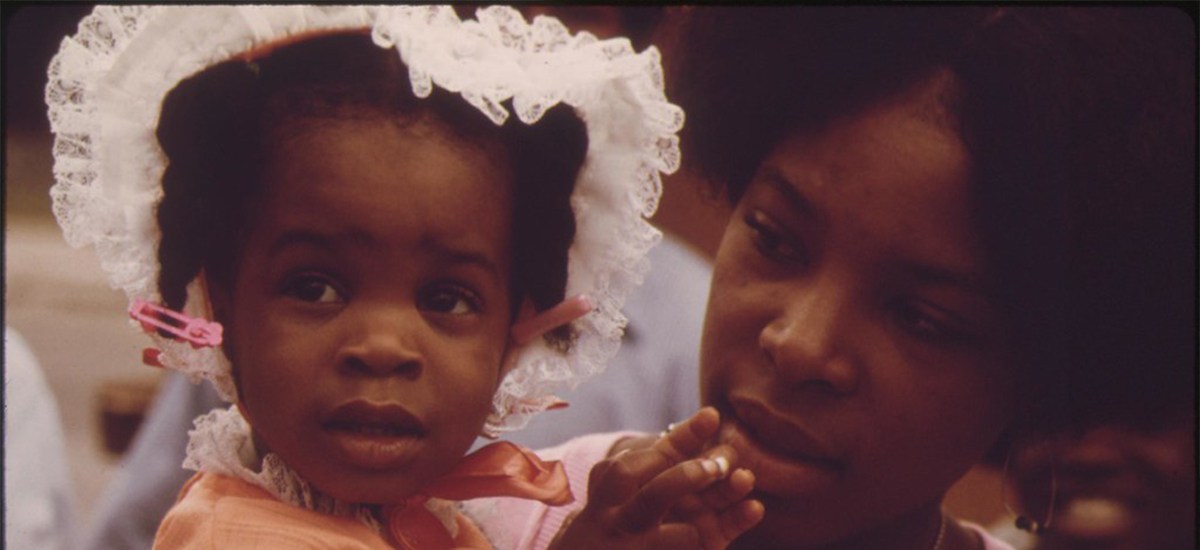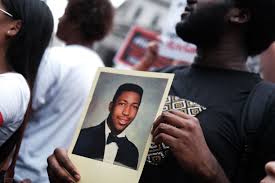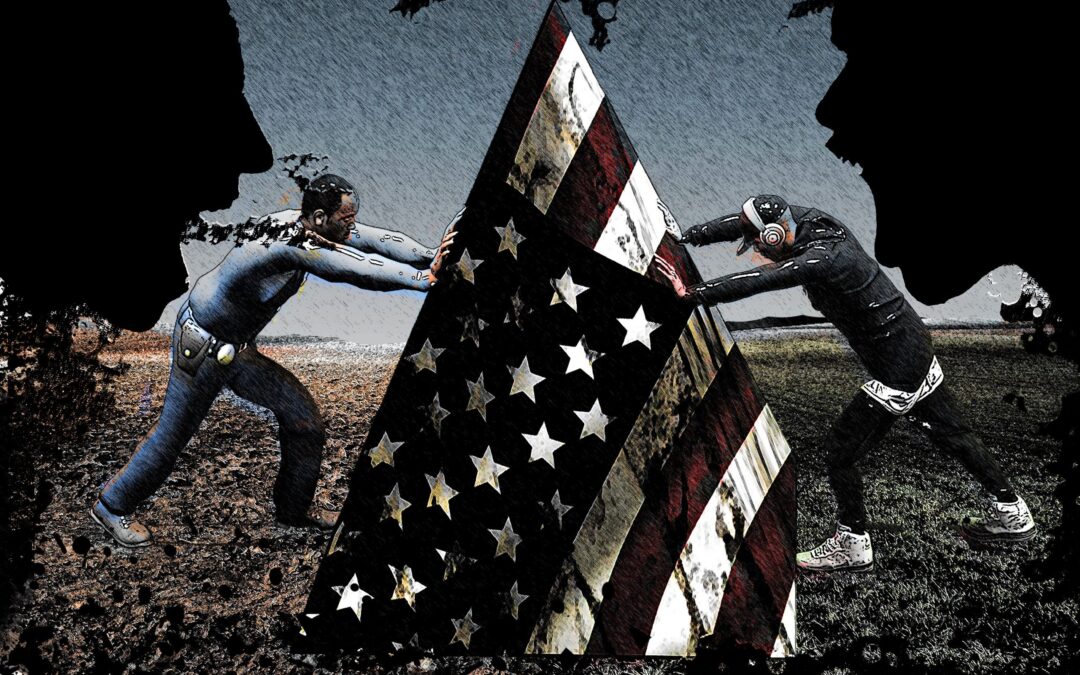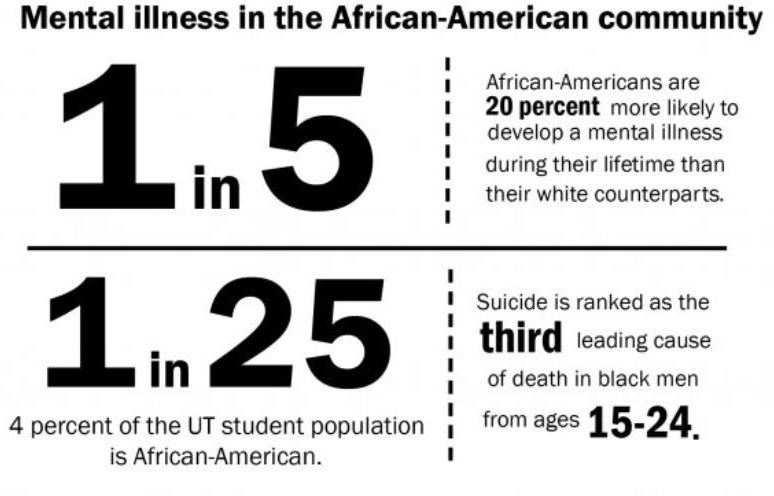By Sade Thompson Bell
In honor of BIPOC Mental Health Awareness Month, I would like to address a great concern in the Black community. There are high rates of mental illness and low levels of treatment due to numerous reasons discussed in this article.
People all over the world are suffering from mental health-related illnesses. Mental illness affects all backgrounds, ethnicities, and religions. In America alone, more than 45 million people identify as Black, comprising almost 14% of the entire U.S. population. But on average, Black Americans are 20% more likely to have a mental illness compared to the general population.
Black adults report feelings of sadness, anger, disappointment and worthlessness at a higher rate compared to White adults. Black people are also more likely to be the victims of serious violent crimes, making them more susceptible to developing post-traumatic stress disorder.
Common Obstacles African Americans Face in Getting Mental Health Treatment
There are many obstacles and unmet needs that cause severe forms of distress within the Black community. Some of the major elements are:
Intergenerational Trauma
Intergenerational trauma caused by over 200 years of slavery combined with discrimination and limited economic opportunities has led to a poor state of psychological, social, and physical health among Black Americans.
The psychological trauma that Black Americans endured across the more than 200 years of their enslavement has been carried on to the present generation and is linked to an existing overall condition of poorer physical and mental health. For instance, statistics show that the prevalence of high blood pressure, prostate cancer, diabetes, and premature heart disease deaths in adult Black Americans is significantly higher than among White Americans.

Credits: http://blackyouthproject.com/intergenerational-trauma-is-gendered-and-other-life-lessons-from-my-black-mother-sister/
Black people are suffering considerably from higher psychological stress and PTSD, which are associated with poor health, physical ailments, depressive symptoms, and chronic disease. Comparable social health statistics indicate higher homicide rates, and Black men are five times as likely to be incarcerated compared to White men. Furthermore, 5% of the Black male population is incarcerated in many states. Illegal drug use and intimate partner violence rates are greatest within Black communities.
Implicit discrimination in the United States is common and is associated with negative health outcomes for Black people. Today’s policies aimed at tackling discrimination and poverty may have little effect, as they specifically address today’s inequalities while doing little to assess the effect of historical injustices on Black health.
Cultural Beliefs
The majority of Black people (around 85%) describe themselves to be “fairly religious.” Their religious beliefs sometimes hinder their ability to seek psychotherapy. Religious people that are uninformed about mental illnesses sometimes consider it to be “punished by God.”
Most often, our communities can cause even more distress by treating people inappropriately for their mental health concerns. Many are less educated when it comes to mental illnesses such as depression, anxiety, and other conditions. This absence of information leads to negative beliefs and shame when it comes to reaching out for psychological help.
Most Black communities are still unaware of the fact that they can seek help for their psychological issues. Some are fearful of others within the community finding out about their problems and being judged. Some lack faith in therapy treatments, while others don’t consider mental illness to be an issue that can be treated in the first place.
Poverty and Lack of Resources
Poverty and lack of resources is another significant barrier for the Black community. Poverty accompanies stress, hunger, homelessness, and an inability to find employment, leading to inadequate health care. These factors serve as further catalysts for many other mental illnesses.
According to a survey done in 2014, the poverty rate for Black people was around 26%. Black people make up about 40% of the homeless population in the U.S. Poverty is often the most contributing factor in mood disorders. Religious beliefs and being uninformed of mental illness paired with poverty make treatment the least preferred option for Black communities.
Insufficient funds and resources also make it more difficult for Black people to reach out for help from mental health professionals. Even in cases in which the individuals suffered from severe depression, most of them had never sought professional help. The main reason for their neglect was the cost of treatment and lack of resources.
Denial and Social Stigma
Experiences of stigma are prevalent in the Black community and often serve as one of the major barriers in seeking mental health treatment. People who show signs of depression are often mistreated for expressing the problem. Some are even called “crazy” for their mental struggles.
Many have thought that being Black and depressed was considered insignificant because they believed they wouldn’t get the same attention that White people do. This creates a sense of denial, with people not admitting the struggle with depression.
Statistics show that 40% of Black people deny having any mental illness despite severe psychological symptoms, 38% report embarrassment for being depressed, 31% refuse to get help, 17% fear their community’s judgment and don’t disclose mental health problems and 63% believe having a mental health condition is a personal weakness.
Racism and Violence
Despite the progress made throughout the years, racism is still a challenge for many people of color living in the United States. Negative stereotypes and attitudes of rejection still prevail and cause physical as well as psychological harm to the Black community. The tension between different races causes a lack of trust and confidence when reaching out for help.
A mistrust in authority is often seen because of the racism that follows. Black people are also more susceptible to death by suicide and violence that causes PTSD at a higher rate. The violence and rejection from other communities make it more difficult for the Black community to reach out for help.
The biased treatments of patients depending on their race, financial and social factors also hinder many people of color in seeking help.
Lack of Similar-Race/Culturally Competent Professionals
 Black people are also reluctant to seek help because of the lack of Black professionals in the mental health field. The absence of a familiar face when seeking treatment makes Black people more hesitant to start therapy. Because of their lack of confidence and mistrust in a mental health professional of a different race, Black people may not benefit properly from their sessions.
Black people are also reluctant to seek help because of the lack of Black professionals in the mental health field. The absence of a familiar face when seeking treatment makes Black people more hesitant to start therapy. Because of their lack of confidence and mistrust in a mental health professional of a different race, Black people may not benefit properly from their sessions.
 Less than 2% of American Psychological Association members are Black. Therefore, finding the right provider is also a concern. Are they experienced in dealing with the problems of Black patients? Are they culturally competent?
Less than 2% of American Psychological Association members are Black. Therefore, finding the right provider is also a concern. Are they experienced in dealing with the problems of Black patients? Are they culturally competent?
Cultural competence is the capacity to comprehend, interact and engage effectively with individuals across cultures. Cultural competence involves being mindful of one’s own way of thinking, cultivating positive attitudes about cultural differences and acquiring knowledge of different cultural traditions and belief systems.
Cultural competence strengthens the therapeutic relationship as many of the mental illnesses experienced correlate with discrimination, trauma, poverty and related factors and it needs to be addressed in therapy. Many non-Black therapists are unaware, afraid or uncomfortable bringing these topics up, leading to Black people dropping therapy after they get the courage to go.
The lack of cultural competence can cause misdiagnosis and mistreatment. Due to this, Black people may sometimes receive poor quality of care from their therapists.
Black men have historically been misdiagnosed and over-diagnosed with schizophrenia because their emotions are looked at as being psychotic.
Black teenagers are 50% more likely than their White peers to show signs of bulimia, but get diagnosed significantly less, even if they have identical symptoms.
Black mothers are at a greater risk for postpartum depression but are less likely to receive treatment.
One solution is training mental health professionals on how to approach and treat mental illness in Black individuals.
How Can We Create Change?

Credits: https://www.scientificamerican.com/article/police-killings-of-unarmed-black-americans-may-affect-health-of-black-infants1/
Most communities need to understand that mental health issues are normal and there’s no shame in seeking help for your distressing thoughts. Knowing the roots of these problems will help develop positive approaches so Black people too can live mentally healthy lives.
The success of any approach to reduce intergenerational trauma and its effects need to be addressed in contexts of the broader picture of Black and White relations in the U.S. Nonetheless, the current ideas of collective accountability for the past era of slavery, White privilege and racial inequality are largely unacknowledged or resisted by many White Americans.
Furthermore, research suggests one way out of this situation is to stress morality and a communal worldview between Black and White Americans in order to minimize the effect of intergroup conflict.
On average, Black Americans are more vulnerable to mental illness. There are several contributing factors stopping them from gaining access to the care they need. Lack of knowledge, racism, poverty, oppression, violence and so forth all contribute toward this lack of treatment.
We as a community also need to support each other more, stop calling those in need “crazy” and end the stigma around seeking treatment so that we can heal and do better in society as a whole.


